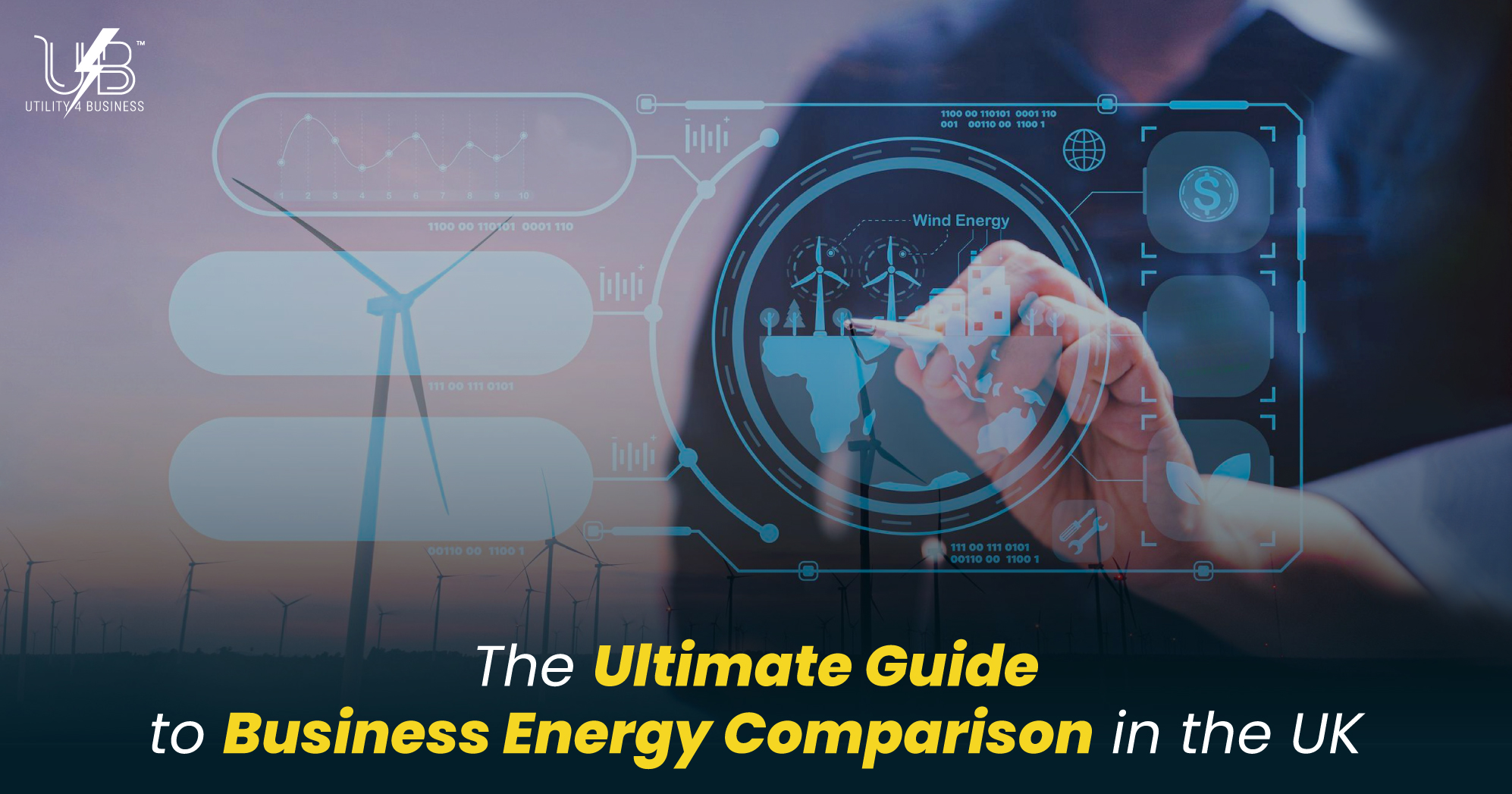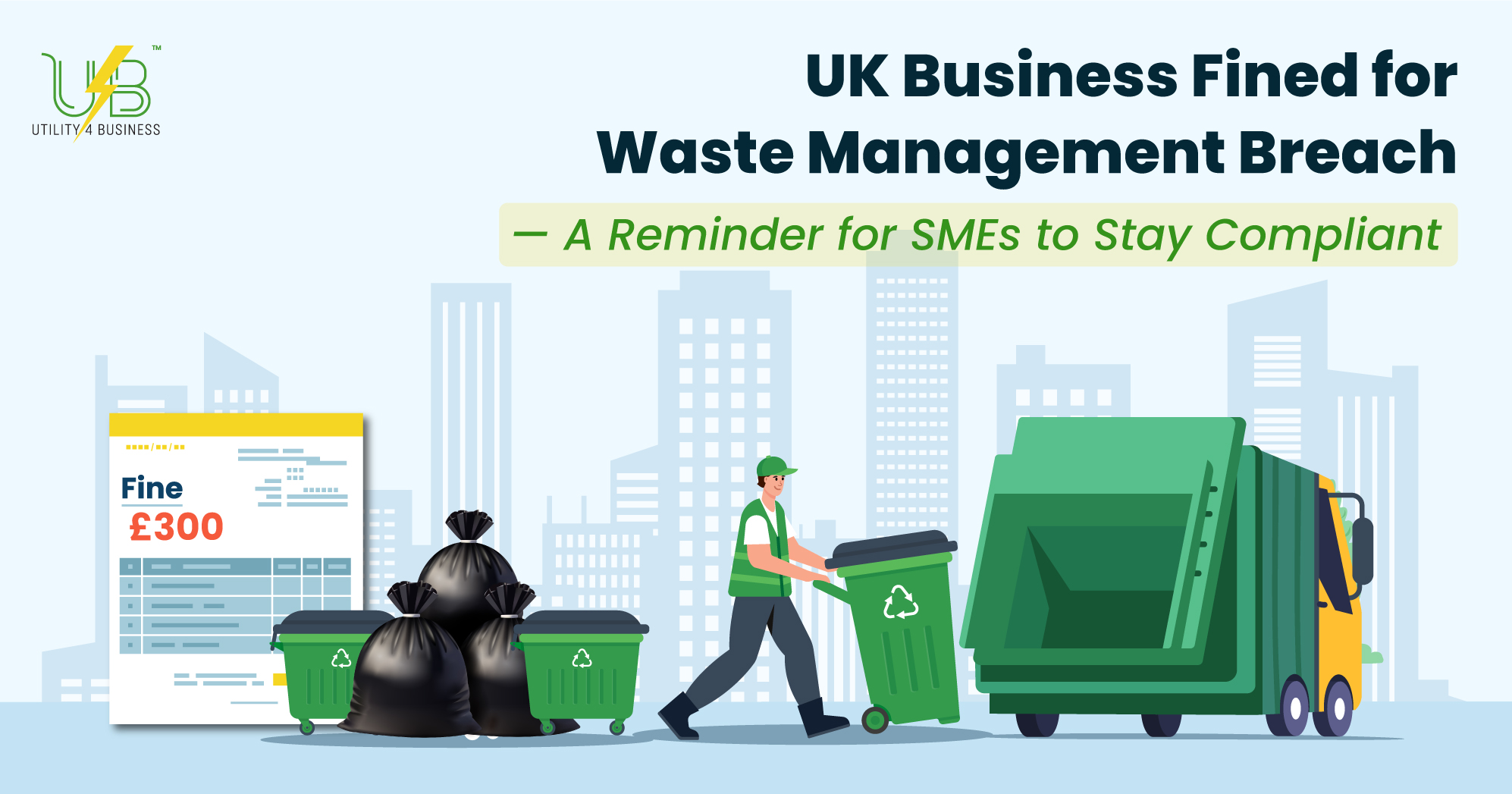The Ultimate Guide to Business Energy Comparison in the UK
Compare UK Business Energy Contracts

Choosing the right energy contract can protect your margins, stabilise cash flow, and reduce risk. Prices move with wholesale markets and network costs, while contract terms determine how those movements affect your bill. This guide explains business energy comparison in practical steps for UK organisations. It uses clear language, covers the checks that matter, and shows how Utility4Business helps you compare energy for business with confidence. You will also see variants of business electricity comparison highlighted so you can recognise the phrases you might search for when reviewing options.
Why Business Energy Decisions Matter
Energy is not a fixed expense. It changes with market conditions, your usage profile, and the fine print in your contract. A weak decision can lock in avoidable costs for years, while a structured review can set a fair price and protect you from surprises. This is where business energy comparison becomes essential. A good process looks past the headline unit rate and checks the standing charge, the way taxes and levies are applied, and the terms that control what happens after your end date. Utility4Business helps you carry out that process with a clear scope, like-for-like quotes, and a step-by-step review that leads to a clean decision.
How Business Energy Works In The UK
Business energy differs from domestic energy in several ways. There is no general price cap for businesses, so you should not expect regulators to limit what suppliers can charge. Quotes vary for each company because suppliers assess usage patterns, metering, credit risk, and contract length. This is why a structured business electricity comparison is more important than a quick price check.
Contracts are also different. You may see fixed, variable, and pass-through structures. Fixed contracts give budget certainty for the term. Variable or pass-through contracts can move with the market or third-party charges, which introduces risk and opportunity. If you do nothing at your end date, you may be placed on deemed or out-of-contract rates that are usually higher. That risk makes timing and preparation vital.
It is worth noting that business billing includes taxes and levies that can change the final amount you pay. Most organisations pay standard VAT on energy, plus the Climate Change Levy. Some businesses qualify for different VAT treatment or levy reliefs, but you must check eligibility and ensure your supplier applies it correctly. This is part of a thorough energy comparison for business and should never be left until after the switch.
Key Terms You Need To Understand
Unit Rate And Standing Charge
The unit rate is the price per kilowatt-hour for energy used. The standing charge is the daily fee that covers fixed network and metering costs. Both matter. A low unit rate combined with a high standing charge can cost more than a higher unit rate with a modest standing charge, depending on your usage.
Contract Length
Common terms range from twelve to thirty-six months. Longer deals trade flexibility for price certainty. Shorter deals keep you closer to the market. Make the decision based on your budget needs and your appetite for risk.
Deemed Or Out-Of-Contract Rates
These rates apply when you use energy without a signed contract, such as after a move-in or after a contract ends without renewal. They are usually expensive. Avoid them by starting your renewal early and aligning your end dates where possible.
Meter Identifiers And Data
Your electricity supply is identified by an MPAN and your gas by an MPRN. You will find them on bills. Larger sites may have half-hourly meters that record usage in thirty-minute intervals. Sharing accurate data helps suppliers price more precisely during a business electricity comparison.
Why A Structured Comparison Beats A Quick Quote
Prices change daily. Terms vary in subtle ways. Taxes and levies apply differently from case to case. A fast decision may appear to save time, but it can introduce hidden costs later. A structured business energy comparison collects your data upfront, asks for like-for-like quotes, and tests the numbers against your real usage. It also checks the clauses that affect what happens if your usage changes, if you move, or if the contract rolls into another period. The result is a clear decision that holds up in day-to-day billing.
Costs And Charges To Review Before You Switch
A useful review looks at every component that feeds your total annual cost:
- Unit Rates And Standing Charges: Compare both, not just the headline unit rate.
- Taxes and Levies: Confirm VAT treatment and whether the Climate Change Levy applies. Check any eligibility for reliefs and ensure the supplier has the correct information for your sites.
- Pass-Through Items: Some contracts separate third-party costs like certain network charges. Understand what can move during the term.
- Extras And Fees: Look for deposits, credit conditions, invoice formats, payment methods, and any broker fees if you use a third party.
- After-End-Date Rules: Review what happens on expiry. Avoid rolling into rates you have not agreed to.
By testing all these elements together, you can execute an electricity business comparison (another way buyers phrase business electricity comparison) that reflects the bill you will actually pay, not just a promotional price.
Contract Types And What They Mean
Fixed Contracts
These lock your unit rate and standing charge for the term. They support budgeting and cash-flow planning. You still pay for the energy you use, so bills rise or fall with consumption, but your rates remain stable.
Variable Or Pass-Through Contracts
These follow movements in underlying markets or third-party charges. They may save money when costs fall, but they can also rise. They require active monitoring and a clear policy for managing risk.
Blend And Extend / Flex Approaches
Larger or energy-intensive organisations sometimes split their volume into blocks and buy at different times. This spreads risk over the year. If you consider this, ensure your metering and reporting support the approach, and set an internal policy for approvals.
When Utility4Business helps you compare energy for business, we explain each structure in plain language. We show you how the terms affect your risk and your budget so you can pick the option that fits how you operate.
When To Start Your Market Check
Do not wait for the last week. Begin your review eight to twelve weeks before your contract end date. That window lets you collect data, check VAT and levy status, request quotes, complete credit checks, and avoid deemed or out-of-contract rates. If you have moved into new premises and are already on a deemed rate, act immediately. Every extra week at a deemed rate usually costs more than a negotiated tariff.
What To Gather Before You Compare
A strong business electricity comparison starts with accurate information. Pull together:
- One recent bill for each site, showing MPAN or MPRN and the full supply address.
- Annual usage in kilowatt hours. If you have a half-hourly meter, arrange a recent export of interval data.
- Contract end date and any renewal notices.
- VAT and levy status, including any charity use or exemptions that apply to your sites.
- Planned changes to operations, such as new equipment, extended opening hours, or EV charging.
With these items ready, you can run a clean energy comparison for business and receive quotes that reflect your reality.
How To Run A Like-For-Like Comparison
Define Your Scope
Are you comparing electricity only, gas only, or both? Do you have multiple sites with different end dates? Align where possible to reduce admin and improve buying power.
Request Quotes With The Same Assumptions
Ask each supplier to quote on the same annual usage and the same metering details. Request the unit rate and standing charge for each term length you will consider.
Include Taxes And Levies
Insist that quotes reflect your actual VAT and levy status. If there is uncertainty, ask for clarification in writing so you know how bills will be calculated after the switch.
Check The Small Print
Read clauses on renewal, termination, and any fees. Look at billing frequency, payment methods, and the rules for deposits or security.
Calculate Total Annual Cost
Use your expected usage to calculate the total cost for each quote, including the standing charge and taxes. This makes the comparison fair. It also helps expose cases where a low unit rate is offset by a high standing charge.
Document Everything
Keep a short record of what you asked, what you received, and the decision you made. Good records help if there is a dispute later and make the next renewal faster.
Utility4Business builds this workflow into every business electricity compare request, so you see the numbers in one clear view.
Fixed Vs Variable: Which One Fits Your Business
For many SMEs, a twelve- to twenty-four-month fixed contract offers the right balance. You lock a stable rate and avoid the task of tracking markets every week. If your organisation is energy-intensive and has strong metering and controls, a variable or pass-through structure can work, but only if you have the capacity to manage it. You should set a simple risk policy that states when you fix, how much you fix, and who signs off on changes. We can help you write that policy and keep it practical.
Avoiding Common Pitfalls
Chasing The Lowest Unit Rate Alone
Do not ignore the standing charge and taxes. Total annual cost at your usage is the only fair comparison.
Starting Too Late
If you leave it until the last days, you increase the chance of missing a better rate or dropping onto a deemed tariff. Start early and set calendar reminders.
Ignoring Metering Details
Wrong MPAN or MPRN details can cause billing errors that take time to correct. Make sure everything matches your bills.
Not Checking VAT And Levy Treatment
If your sites qualify for a different VAT rate or levy relief, confirm it before you sign and supply any forms the supplier requests.
Forgetting About Broker Fees
If you use a broker, ask for transparent fee disclosure. Make sure you understand how and where the fee is collected.
These issues appear simple, yet they cause most billing disputes. A calm and complete business electricity comparison avoids them.
Smart Metering And Better Data
Smart and advanced meters reduce estimated bills and provide accurate usage patterns. Better data helps your business energy comparison because suppliers' price quotes are based on your real profile. If you have half-hourly data, share it with your request. If you do not, consider upgrading your metering during the term. It will support efficient work and give you stronger evidence when you next renew.
Multi-Site And Half-Hourly Customers
If you manage several locations, align end dates over time so you can review once rather than many times. Grouping sites can also improve your negotiation position and reduce admin. For half-hourly customers, interval data is essential. It shows when you use power, not just how much. Suppliers price more precisely with it, and you can test how changes in opening hours or processes will affect the bill.
Managing Risk, Budget, And Cash Flow
Energy risk management does not need to be complex. Use a simple checklist:
- Fix for a period that matches your budget cycle.
- Avoid excessive speculation on variable rates unless you have a clear policy.
- Track contract end dates and meter changes.
- Review usage quarterly to spot anomalies early.
- Build a short internal note of decision rules so handovers are easy.
At Utility4Business, we provide a one-page summary that shows the chosen contract, the rationale, and key dates. This reduces dependency on individuals and keeps your approach consistent.
How Utility4Business Helps
Utility4Business specialises in business electricity comparison and gas procurement for UK organisations. We help you compare energy for business by:
- Gathering accurate site and metering data so quotes reflect your real usage.
- Presenting like-for-like offers with clear unit rates, standing charges, and taxes.
- Explaining any pass-through items in plain language so you understand the risks.
- Checking contract terms for renewal rules, deposits, and billing details.
- Managing timelines and reminders so you avoid deemed or out-of-contract rates.
We also help you look beyond energy to the wider cost base. Many clients review utilities alongside Business Insurance Services, so renewals align and cash flow is smoother through the year. If you want deeper context on how prices form, we can also point you to “Read About Business Electricity Rates” resources that explain the drivers, from wholesale markets to network charges, in clear terms.
Turning Quotes Into A Decision
Consider a single-site retailer using mid-range electricity across the year. Quote A offers a very low unit rate but a high standing charge. Quote B has a slightly higher unit rate but a lower standing charge. Quote C is a fixed term with some pass-through elements. Once we calculate the total annual cost at expected usage and apply the correct taxes, Quote B wins. The result surprises the client because Quote A looked the cheapest at first glance. This is the value of a structured compare business electricity exercise. It replaces guesswork with a clear number and a contract that works in practice.
Conclusion
A clear business energy comparison can protect your cash flow and reduce risk. Collect your data, ask for like-for-like quotes, confirm VAT and levy status, and read the terms that control what happens after your end date. Do the maths on total annual cost for your usage rather than relying on a headline unit rate. Start early so you avoid deemed or out-of-contract rates and give yourself time to make a steady decision.
Utility4Business is ready to help you compare energy for business in a way that is simple, accurate, and fast. We focus on clarity, we explain differences in plain language, and we handle timelines so nothing slips. If you want extra context, you can Read About Business Electricity Rates to understand the drivers behind the numbers. When you are ready, we will run the business electricity comparison for your sites and present a decision you can trust.
Find This Article Helpful? Share It Now!
At Utility4Business, we offer top-notch customer support and business utility solutions for businesses across the UK. Consider sharing this article and helping others discover how our expertise can add value to their business success.

Read Our Latest Posts
Explore our latest blog posts and learn how Utility4Business can support your business growth with tailored utility solutions and services. Stay ahead of the curve with the latest information from industry experts and take advantage of our user-friendly comparison services to find the best business deals.


Get Connected
At Utility4Business, our team of experts can help you figure out the highest-value business utility deals that will help your business grow over time.


